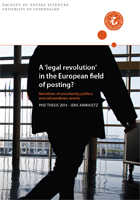A "legal revolution" in the European field of posting?
- Narratives of uncertainty, politics and extraordinary events
PhD dissertation by Jens Arnholtz
The dissertation concerns the construction of the European Court of Justice´s Laval ruling as a social, political and legal phenomenon. The Laval ruling has come to be a symbol of how the European Union is challenging workers’ rights, and as such it has been intensely debated in legal, political and scholarly circles. The dissertation draws on the sociology of Bourdieu to reconstruct the symbolic struggles that caused this particular ruling to be regarded as a genuine ‘legal revolution’. Tracing the process meticulously, it is suggested that the huge symbolic impact of the ruling was not just caused by the content of the ruling or its material consequences; rather, the political context, the build-up of the case and the political aftermath have played decisive roles in making this ruling stand out as a symbol of how the European Court of Justice encouraged social dumping and downgrading workers’ rights.
 The dissertation traces the origin of the posting phenomenon within the EU and outlines the tensions inherent within it. While the free movement of workers has contested the member states’ monopoly on the legitimate forms of labour mobility within the EU, member states still retained the right to regulate the wages and working conditions of foreign workers in the manner they saw fit by applying the same rules as for domestic workers. However, this principle of ‘equal treatment’ between foreign and domestic workers was not applied to posted workers. The analysis shows how posted workers – workers employed in one country but sent abroad by their employer to work in another country – were gradually separated into a category of their own and potentially governed by principles other than that of ‘equal treatment’. Thus, the phenomenon of posting became a form of labour mobility under which it was somewhat unclear who could regulate the wages and working conditions of posted workers. While this issue has existed for decades, it was only after the most recent EU enlargements that posting became a highly controversial issue. The enlargement markedly increased socioeconomic differences within the EU and created great incentives to deviate from the principle of ‘equal treatment’. It is in this context that the Laval ruling – and three other rulings from the ECJ – problematised the legitimacy of actions by trade unions and member states aimed at securing equal treatment for posted workers.
The dissertation traces the origin of the posting phenomenon within the EU and outlines the tensions inherent within it. While the free movement of workers has contested the member states’ monopoly on the legitimate forms of labour mobility within the EU, member states still retained the right to regulate the wages and working conditions of foreign workers in the manner they saw fit by applying the same rules as for domestic workers. However, this principle of ‘equal treatment’ between foreign and domestic workers was not applied to posted workers. The analysis shows how posted workers – workers employed in one country but sent abroad by their employer to work in another country – were gradually separated into a category of their own and potentially governed by principles other than that of ‘equal treatment’. Thus, the phenomenon of posting became a form of labour mobility under which it was somewhat unclear who could regulate the wages and working conditions of posted workers. While this issue has existed for decades, it was only after the most recent EU enlargements that posting became a highly controversial issue. The enlargement markedly increased socioeconomic differences within the EU and created great incentives to deviate from the principle of ‘equal treatment’. It is in this context that the Laval ruling – and three other rulings from the ECJ – problematised the legitimacy of actions by trade unions and member states aimed at securing equal treatment for posted workers.
Empirically, the dissertation argues that while these material issues are clearly important, the uproar caused by the Laval rulings can only be understood if we study the symbolic struggles surrounding the case. The adoption of the Services Directive in the years leading up to the ruling formed a political context, where trade unionists and centre-left politicians had argued that there was a broad political consensus behind efforts to increase worker protection and prevent social dumping. Thus, the ruling was portrayed as going against the expressed will of the legislators. Additionally, the build-up of the cases entailed a number of controversial events, which amplified the issues of principle at stake in the case while understating the particularities of the case. Also, the case was linked to three other cases and portrayed as part of a common tendency in the rulings of the ECJ. Finally, the aftermath of the decision has involved a number of spectacular events in which a group of actors has come together to mobilise a political response to the rulings – including treaty change. During this process, the four rulings of the ECJ have been linked to EU referendums, Commission renewals and extraordinary events in an effort to promote a political response. All of these elements, it is argued, have contributed to making Laval such a symbolic stake in the struggle over the future of European integration.
On a theoretical level, the dissertation uses Bourdieu's concepts of field, strategy and symbolic struggle to analyse the processes that have constructed Laval.
Jens Arnholtz's PhD dissertation can be bought at Academic Books, Øster Farimagsgade 5, 1014 Copenhagen K.
